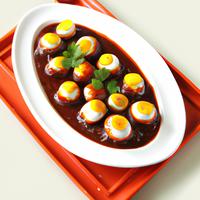
1 serving (200 grams) contains 250 calories, 10.0 grams of protein, 15.0 grams of fat, and 20.0 grams of carbohydrates.

Log this food in SnapCalorie

Nutrition Information
Calories |
294.1 | ||
|---|---|---|---|
% Daily Value* |
|||
| Total Fat | 17.6 g | 22% | |
| Saturated Fat | 3.5 g | 17% | |
| Polyunsaturated Fat | 0 g | ||
| Cholesterol | 176.5 mg | 58% | |
| Sodium | 941.2 mg | 40% | |
| Total Carbohydrates | 23.5 g | 8% | |
| Dietary Fiber | 2.4 g | 8% | |
| Sugars | 5.9 g | ||
| protein | 11.8 g | 23% | |
| Vitamin D | 47.1 mcg | 235% | |
| Calcium | 58.8 mg | 4% | |
| Iron | 2.4 mg | 13% | |
| Potassium | 235.3 mg | 5% | |
* Percent Daily Values are based on a 2,000 calorie diet. Your daily values may be higher or lower depending on your calorie needs.
Food Attributes
Source of Calories
About Egg manchurian
Egg Manchurian is a flavorful dish rooted in Indo-Chinese cuisine, blending the zest of Chinese sauces with Indian culinary traditions. Made primarily with boiled or scrambled eggs, this dish incorporates vibrant ingredients like onions, capsicums, garlic, ginger, and green chilies, which are sautéed in a rich, tangy mix of soy sauce, ketchup, and chili sauce. Often garnished with fresh coriander, Egg Manchurian offers a satisfying balance of textures and bold flavors. Nutritionally, the dish provides protein from the eggs, vitamins, and antioxidants from the vegetables. However, due to the inclusion of refined sugar in sauces and the potential use of excess oil during cooking, it can be high in fats and calories if not prepared mindfully. For a healthier version, opting for minimal oil and low-sodium sauces can make this dish a more wholesome option while retaining its signature taste.



